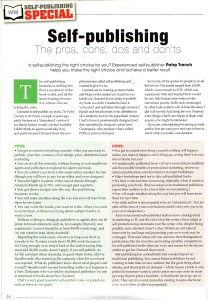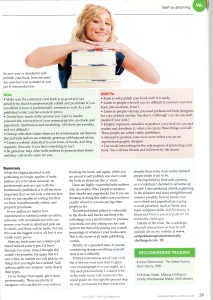Then pros, cons, dos and don’ts of self publishing
(Writers’ News July 2014)
The self publishing business is nothing less than a revolution in the book world, and all the more exciting because it is writers who are setting the rules.
I decided to self publish my book three years ago, partly because as a ‘dramatised’ version of my family history in early colonial Australia I didn’t think an agent would take it on, and partly because I’d heard about this new phenomenon called self publishing and wanted to give it a try.
If you are contemplating becoming an indie author, here are some pros and cons to do with self publishing:
PROS:
- You get to control everything yourself: when you are ready to publish, your title, contents, cover design, price, distribution and marketing.
- You can do all this instantly, without having to wait months for agents and publishers to respond to/reject your book.
- You can submit your book to the major online retailers for free (though you will have to pay for an editor and cover designer).
- You earn higher royalties: in the case of ebooks through Amazon/Kindle up to 70%, and you get paid regularly.
- You get direct insight into the way the publishing business works.
- You can write the books you want to write, when you want to write them, without worrying about subject matter or word count.*
- You will make mistakes along the way but you will learn from them for next time.
* Without wishing to denigrate publishers or agents they are subject to broad statements such as, for example (from my own experience): ‘a novel should be at least 80,000 words long’, and ‘no one wants to read about Australia’.
Regarding the word count, a book is as long or as short as it needs to be. To reject a book that’s 50,000 words because it isn’t long enough, or to send it back to the author saying they must add 30,000 words, doesn’t apply if you self publish. As for the comment about Australia, to quote Mark Coker, CEO of Smashwords, who started up his company when his own book was rejected, ‘What do publishers know about what people want to read?’ Smashword’s current best selling author as it happens is a New Zealander who was told by traditional publishers ‘no one is interested in books about New Zealand’.
So that’s a very good reason to self publish: rules or prejudices such as these do not apply.
CONS:
- You get to control everything yourself: nothing will happen unless you make it happen, and if things go wrong there’s no one else to blame but you!
- A traditionally published book will have more instant credibility and the possible benefits of professional marketing, reviews in national publications and distribution in major bookshops.
- Major bookshops tend not to take self published books.
- It’s hard work and time-consuming, especially when it comes to promoting your book. (But nowadays even traditional publishers expect their authors to do a lot of their own marketing.)
- An indie author is also required to be an ‘entrepreneur’. You are after all the boss of your own business and it’s down to you to be your own salesperson.+
- You will make mistakes along the way but you will learn from them for next time.
+ It appears that a large chunk of successful self published authors have a background in marketing or IT, and the risk is that the writer who is adept at self promotion may dominate over the writer who, despite being possibly more talented, hasn’t a clue. Writers are not natural extraverts by and large and promoting your own work may be a struggle. That said, talent will out, as someone once said, and now that distinguished publications like The Guardian are holding monthly competitions for self published books there are ways and means for the shyest author to get her/himself discovered.
Self publishing has undoubtedly had a major impact on traditional publishing. You cannot blame publishers for not wanting to take risks on new authors, but the great thing about ebooks, and about print on demand – which means a book is only printed if someone wants it, and to print one copy costs no more per copy than to print a hundred – is that books never go out of print. They are, in a word, immortal, existing in some electronic form somewhere or other in perpetuity.
So, assuming you have chosen to be an indie author, here are some dos and don’ts to consider:
DOs:
- Make sure the content of your book is as good as it can possibly be, that it is professionally edited and proofread. If you can afford it, have it professionally assessed as well. As a self published writer you have more to prove.*
- Decide how much of the process you want to handle yourself: the conversion of your manuscript into an ebook and paperback, distribution and marketing. (All these are possible, and not difficult.)
- Link up with other writers: there is a lot of information out there for free and indie authors are extremely generous with help and advice.
- Create a website dedicated to your book, or books, and blog regularly (but only if you have something to say).
- Be generous: help other indie authors to promote their books and they will do the same for you.
DON’Ts:
- Rush to self publish your book until it is ready.
- Listen to people who tell you it’s difficult to convert your own book into an ebook. It isn’t.
- Listen to people who say you need professional book designers for your printed version. You don’t. (Although you can use such people if you wish.)
- Employ expensive outsiders to produce your book for you and market and distribute it, when you can do these things yourself. These people are called vanity publishers. #
- Attempt to produce your own cover unless you are an experienced graphic designer.
- Use social networking for the sole purpose of promoting your book. You will lose friends and followers by the dozen.
While the stigma attached to self publishing no longer applies, if indie authors are to be taken seriously as professionals and on a par with the traditionally published, it is all the more important that we not only write the best book we are capable of writing but that we have it professionally edited, and properly proofread. Every author, no matter how experienced or talented, needs an editor, someone with an outside eye who can peruse your book in detail and pick out its faults, and there will be faults. For me this was the biggest cost of all, but it was worth every penny.
After my book came out a sharp-eyed friend noticed some typos. I’d been through it so many times I thought this couldn’t be possible, but again this is a case where an outside eye will pick up on things that you might have missed. And nothing spells out ‘amateur’ more clearly than typos.
Cover design: here again, get it done professionally. There are plenty of designers who can this for you without breaking the bank, and again, while you are proud to self publish you don’t want the book to shout out the ‘a’ word.
There are highly successful indie authors who do employ other people to produce their ebooks and paperbacks, but if you are thinking of doing this make sure you know exactly what it is you are paying other people to do. The self published author is vulnerable to the sharks and hawks out there who will charge you a small fortune to produce your book, not only asking you for £££ upfront but then only paying you a small percentage of whatever your books earn. This is what’s called the worst of all worlds.
Recommended reading:
Alison Baverstock, The Naked Author, Bloomsbury, 2001
Michael Alvear, Making a Killing on Kindle, Woodpecker Media, 2012 (ebook)
Joanna Penn: www.thecreativepenn.com


